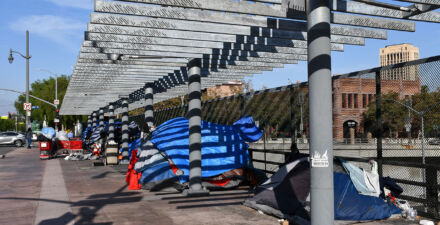Family income for those at the bottom of the U.S. economic distribution have barely budged over the past several decades, while those at the top have skyrocketed. Twelve percent of Americans live in poverty today, including nearly 10 million children. Equitable Growth is growing the evidence base for how rising inequality affects the economic wellbeing of those at the bottom of the economic ladder in order to support the creation of policies that provide both a safety net and a springboard to opportunity for the most disadvantaged among us.
Featured work
The economic impact of housing insecurity in the United States
December 8, 2022
December 8, 2022
In Conversation with Mark Rank
April 14, 2021
April 14, 2021
Income support programs boost earnings for low-wage workers by reducing household poverty in the United States
August 26, 2021
August 26, 2021
Newly released U.S. poverty statistics show that recent economic growth is not broadly shared
September 11, 2019
September 11, 2019
We can cut child poverty in the United States in half in 10 years
March 27, 2019
March 27, 2019
As the U.S. rural economy changes, social safety net programs buoy rural residents above the poverty line
February 1, 2019
February 1, 2019
Explore Content in Poverty141
The coronavirus recession and economic inequality: A roadmap to recovery and long-term structural change
April 16, 2020
April 16, 2020
Rescuing small businesses to fight the coronavirus recession and prevent further economic inequality in the United States
April 14, 2020
April 14, 2020
U.S. economic policy principles for confronting the coronavirus recession
April 8, 2020
April 8, 2020
The most exposed workers in the coronavirus recession are also key consumers: Making sure they get help is key to fighting the recession
April 8, 2020
April 8, 2020
The Matching Multiplier and the Amplification of Recessions
April 8, 2020
April 8, 2020
The only thing better than strengthening federal social supports now to prevent a coronavirus recession is strengthening them forever
March 17, 2020
March 17, 2020
Improved public school teaching of racial oppression could enable U.S. society to grasp the roots and effects of racial and economic inequality
February 27, 2020
February 27, 2020
Addressing the need for affordable, high-quality early childhood care and education for all in the United States
February 18, 2020
February 18, 2020
Earnings instability and mobility over our working lives: Improving short- and long-term economic well-being for U.S. workers
February 18, 2020
February 18, 2020
Policies to strengthen our nation’s Supplemental Nutrition Assistance Program
February 18, 2020
February 18, 2020
Race and the lack of intergenerational economic mobility in the United States
February 18, 2020
February 18, 2020
Explore the Equitable Growth network of experts around the country and get answers to today's most pressing questions!


















